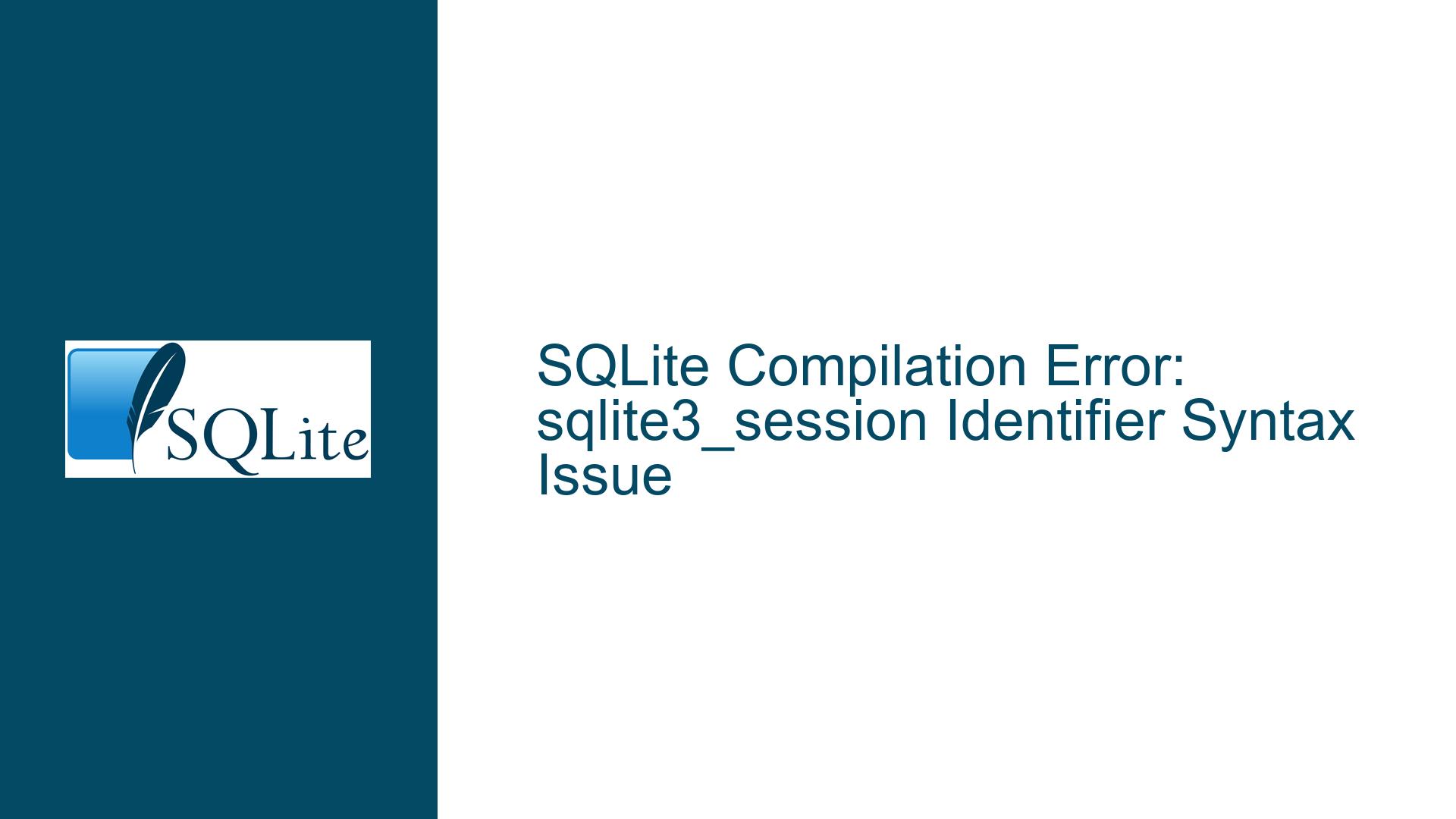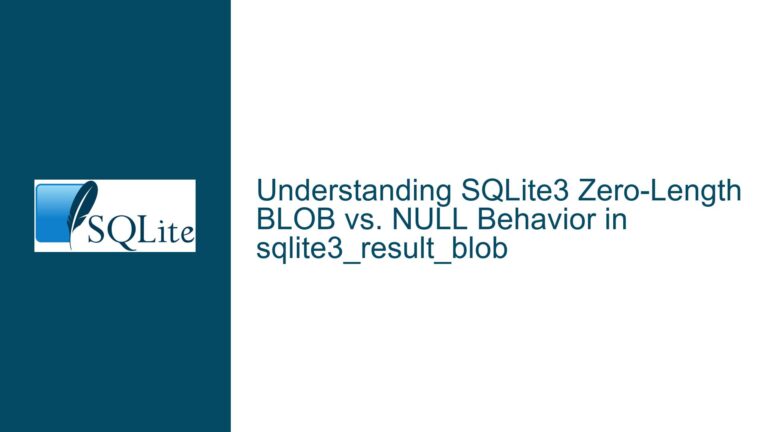SQLite Compilation Error: sqlite3_session Identifier Syntax Issue
Issue Overview: Compilation Error with sqlite3_session Identifier
When compiling SQLite with the SQLITE_ENABLE_PREUPDATE_HOOK and SQLITE_ENABLE_SESSION options enabled, a syntax error occurs related to the sqlite3_session identifier. The error manifests as follows:
- MSVC Compiler Error:
sqlite3.c(206932): error C2061: syntax error: identifier 'sqlite3_session' - GCC Compiler Error:
sqlite3.c:206932:3: error: unknown type name 'sqlite3_session'
The error arises because the sqlite3_session type is not recognized during compilation. This issue is particularly problematic when using a custom config.h file to define SQLite configuration options, as the order of header inclusion has changed in recent versions of SQLite. Specifically, the config.h file, which contains the necessary definitions for sqlite3_session, is now included after other headers that depend on it, leading to the compilation failure.
Possible Causes: Header Inclusion Order and Configuration Dependencies
The root cause of this issue lies in the order of header inclusion and the dependencies between configuration definitions. Here are the key factors contributing to the problem:
Header Inclusion Order: In recent versions of SQLite, the
config.hfile, which contains user-defined configuration options, is included after other headers that depend on these options. This change in inclusion order can lead to compilation errors if the headers rely on definitions that are not yet available.Configuration Dependencies: The
sqlite3_sessiontype and related functionality are enabled by theSQLITE_ENABLE_SESSIONandSQLITE_ENABLE_PREUPDATE_HOOKoptions. If these options are defined inconfig.h, butconfig.his included after the headers that require these definitions, the compiler will not recognize thesqlite3_sessiontype, resulting in a syntax error.Custom Configuration Files: Users who rely on a custom
config.hfile to define SQLite configuration options may encounter this issue more frequently. Theconfig.hfile is often used to centralize configuration settings, especially on platforms like Windows where autoconfig is not run. However, if the inclusion order ofconfig.his not carefully managed, it can lead to compilation errors.Compiler-Specific Behavior: The issue may manifest differently depending on the compiler used. For example, MSVC and GCC may produce different error messages, but the underlying cause remains the same: the
sqlite3_sessiontype is not recognized due to the incorrect order of header inclusion.
Troubleshooting Steps, Solutions & Fixes: Ensuring Proper Header Inclusion Order
To resolve the compilation error related to the sqlite3_session identifier, it is essential to ensure that the config.h file is included before any other headers that depend on its definitions. Here are the steps to troubleshoot and fix the issue:
Modify the Header Inclusion Order: The most straightforward solution is to modify the inclusion order of headers in the SQLite source code. Specifically, the
config.hfile should be included at the very beginning of thesqlite3.cfile. This ensures that all necessary definitions are available before any other headers are processed.Index: tool/mksqlite3c.tcl =================================================================== --- tool/mksqlite3c.tcl +++ tool/mksqlite3c.tcl @@ -78,22 +78,25 @@ ** if you want a wrapper to interface SQLite with your choice of programming ** language. The code for the "sqlite3" command-line shell is also in a ** separate file. This file contains only code for the core SQLite library. */ #define SQLITE_CORE 1 -#define SQLITE_AMALGAMATION 1}] +#define SQLITE_AMALGAMATION 1 +#if defined(_HAVE_SQLITE_CONFIG_H) && !defined(SQLITECONFIG_H) +#include "config.h" +#define SQLITECONFIG_H 1 +#endif}] if {$addstatic} { puts $out \ {#ifndef SQLITE_PRIVATE # define SQLITE_PRIVATE static #endif} }This modification ensures that
config.his included at the beginning of thesqlite3.cfile, allowing all subsequent headers to access the necessary definitions.Use Compiler-Specific Forced Includes: Some compilers, such as MSVC, support forced includes, which can be used to ensure that
config.his included before any other headers. For MSVC, the/FIoption can be used to force the inclusion ofconfig.hat the beginning of the compilation unit.cl /FIconfig.h sqlite3.cThis approach is particularly useful for users who prefer not to modify the SQLite source code directly.
Create a Wrapper File: Another approach is to create a wrapper file that includes
config.hbefore including the mainsqlite3.cfile. This method is useful for users who want to maintain a clean separation between their custom configuration and the SQLite source code.// wrapper.c #include "config.h" #include "sqlite3.c"Compile the wrapper file instead of the original
sqlite3.cfile:cl wrapper.cReview and Update Configuration Definitions: Ensure that all necessary configuration options are defined in
config.h. In particular, verify thatSQLITE_ENABLE_SESSIONandSQLITE_ENABLE_PREUPDATE_HOOKare correctly defined. Additionally, check for any other dependencies that may require specific definitions to be available early in the compilation process.#define SQLITE_ENABLE_SESSION 1 #define SQLITE_ENABLE_PREUPDATE_HOOK 1Consider Alternative Configuration Methods: If modifying the inclusion order or using forced includes is not feasible, consider alternative methods for defining configuration options. For example, some users may prefer to define configuration options directly in the compiler command line using the
-Doption.cl -DSQLITE_ENABLE_SESSION=1 -DSQLITE_ENABLE_PREUPDATE_HOOK=1 sqlite3.cThis approach avoids the need for a
config.hfile altogether, though it may become cumbersome with a large number of configuration options.Test and Validate the Fix: After applying the chosen solution, recompile the SQLite source code and verify that the compilation error is resolved. Ensure that all functionality related to the
sqlite3_sessiontype and the session extension is working as expected.
By carefully managing the inclusion order of headers and ensuring that all necessary configuration definitions are available early in the compilation process, the compilation error related to the sqlite3_session identifier can be effectively resolved. This approach not only addresses the immediate issue but also helps prevent similar problems in the future by maintaining a clear and consistent configuration strategy.






